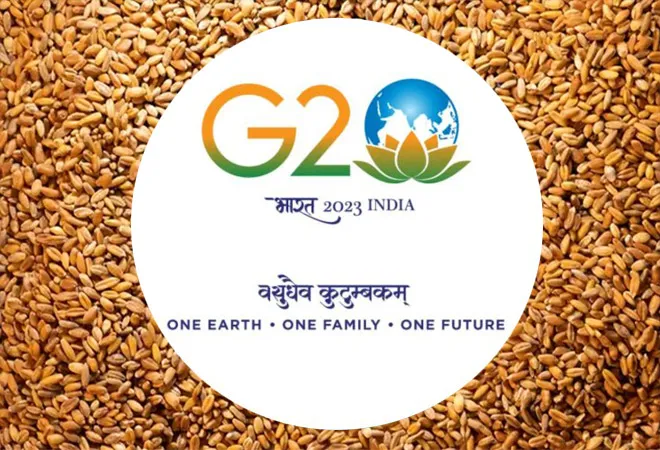-
CENTRES
Progammes & Centres
Location
Food insecurity remains a significant challenge in many G20 nations; concerted efforts are needed to address the issue

Despite being the world’s largest economies, food insecurity remains a significant challenge in some G20 countries. The COVID-19 pandemic has exacerbated this problem in many countries, particularly those with pre-existing food security challenges.
Both COVID-19 and the Ukraine conflict have had significant impacts on food security in G20 nations. The pandemic has disrupted food supply chains, leading to shortages and price increases in some regions. Lockdowns and travel restrictions have also made it difficult for farmers to sell their produce and for consumers to access food. The economic impact of the pandemic, including job losses and reduced incomes, have made it more difficult for many people to afford food, exacerbating food insecurity and malnutrition. War and conflict situations have disrupted agricultural production, destroyed infrastructure and markets, and led to displacement and food shortages. Displacement due to war and conflict has also led to loss of livelihoods and reduced access to food.
War and conflict situations have disrupted agricultural production, destroyed infrastructure and markets, and led to displacement and food shortages.
Malnutrition and food insecurity are closely linked; the inadequate access to sufficient and nutritious food has contributed substantially to both issues. Malnutrition is a complex issue that encompasses both undernutrition and overnutrition. While malnutrition remains a significant challenge in many G20 nations, the specific situation varies across countries. India, Indonesia, and South Africa are among the G20 countries with the highest prevalence of undernutrition, including stunting and wasting in children and micronutrient deficiencies. Despite being a high-income country, Australia also experiences pockets of undernutrition, particularly amongst Indigenous populations. In some G20 countries, such as Brazil and Mexico, undernutrition is declining but still affects a significant proportion of the population. On the other hand, overnutrition is a growing problem in many G20 countries, particularly those with high-income levels and urbanisation rates. The United States (US) and Mexico are among the countries with the highest rates of obesity in the world, with rates also increasing in countries such as Brazil, China, and India. Overall, addressing both malnutrition and food insecurity in G20 nations will require a multifaceted and coordinated approach, with a focus on improving food access, promoting healthy diets and lifestyles, and addressing poverty and inequality.
Fig 1: Prevalence of undernourishment (percentage of the population)
According to the latest available data from the World Bank, which is for the year 2020, the prevalence of undernourishment in G20 countries varies widely. While some G20 countries have very low levels of undernourishment (such as the US, Canada, and Australia), the opposite is observed in others, particularly in Sub-Saharan Africa and South Asia. Fig 1 shows the prevalence of undernourishment in select G20 countries, expressed as the percentage of the population. India has the world's highest number of undernourished people, followed by South Africa. Mexico is the world's eleventh-largest economy but has high levels of food insecurity, particularly in rural areas. Indonesia has made progress in reducing hunger in recent years, but food insecurity remains a significant challenge. Brazil is one of the world's largest food producers, but many Brazilians still suffer from hunger and malnutrition. While the situation varies country-to-country, it is clear that food insecurity remains a significant challenge that requires concerted action from governments, international organisations, and civil society.
There are several challenges to food security that G20 countries face, both in their own countries and globally:
While the situation varies country-to-country, it is clear that food insecurity remains a significant challenge that requires concerted action from governments, international organisations, and civil society.
Overall, the G20 is committed to addressing the complex challenges of food and nutritional security through a range of initiatives and collaborations with governments, international organisations, and civil society. Two key initiatives in recent years are the Matera Declaration and the UN Food Systems Summit. The Matera Declaration was adopted at the G20 Agriculture Ministers’ Meeting in Matera, Italy, in September 2021. The declaration highlights the need to strengthen resilience and sustainability of agri-food systems, enhance global cooperation, support smallholder farmers, and reduce food waste and loss. The UN Food Systems Summit, held in September 2021, brought together governments, the private sector, civil society, and other stakeholders to address the interconnected challenges of food security, nutrition, and sustainability. The summit focused on five action tracks: Ensuring access to safe and nutritious food for all; shifting to sustainable consumption patterns; boosting nature-positive production at scale; advancing equitable livelihoods and value distribution; and building resilience to vulnerabilities, shocks, and stresses.
The G20 has also undertaken other initiatives related to food security, such as the Agricultural Market Information System (AMIS), which aims to improve market transparency and reduce food price volatility, and the Global Agriculture and Food Security Program (GAFSP), which provides funding to support smallholder farmers in developing countries.
The declaration highlights the need to strengthen resilience and sustainability of agri-food systems, enhance global cooperation, support smallholder farmers, and reduce food waste and loss.
As India holds the G20 presidency, it has a significant responsibility to address the issue of food insecurity.
Overall, food insecurity remains a significant challenge in many G20 nations, and concerted efforts are needed to address the issue through a range of interventions, including improving access to healthy and nutritious foods, promoting healthy lifestyles, and investing in social protection programmes.
Shoba Suri is a Senior Fellow with ORF’s Health Initiative.
The views expressed above belong to the author(s). ORF research and analyses now available on Telegram! Click here to access our curated content — blogs, longforms and interviews.

Dr. Shoba Suri is a Senior Fellow with ORFs Health Initiative. Shoba is a nutritionist with experience in community and clinical research. She has worked on nutrition, ...
Read More +